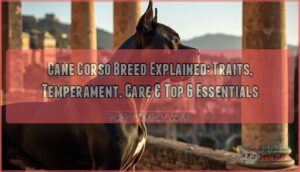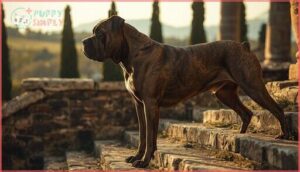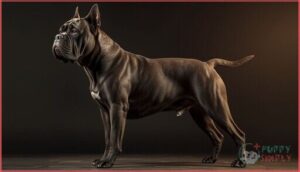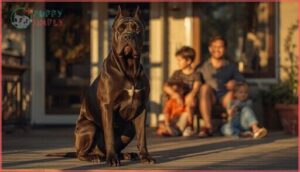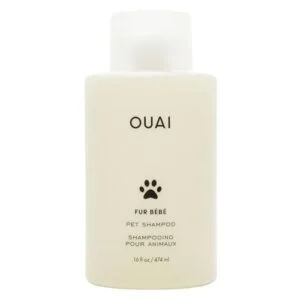This site is supported by our readers. We may earn a commission, at no cost to you, if you purchase through links.
The ancient Romans knew what they needed: a dog powerful enough to guard estates, brave enough to hunt wild boar, and intelligent enough to think independently on the battlefield. They bred the Cane Corso, a mastiff-type guardian whose name literally translates to “bodyguard dog” from Latin.
These aren’t dogs for passive households—they’re 100-pound athletes with territorial instincts and minds that constantly assess their surroundings. Today’s Cane Corso still carries that protective drive, making them outstanding family guardians when properly trained, but challenging companions for inexperienced owners.
Understanding this breed’s physical power, mental intensity, and specific care requirements will determine whether you’re prepared to channel their guardian heritage into a loyal, well-adjusted companion.
Table Of Contents
- Key Takeaways
- Cane Corso Breed Overview
- Physical Characteristics of The Cane Corso
- Temperament and Family Suitability
- Cane Corso Health, Care, and Training
- Top 6 Essential Products for Cane Corsos
- Frequently Asked Questions (FAQs)
- What health issues are common in the breed?
- How much grooming and shedding can I expect?
- What kind of food and nutrition do they need?
- How much exercise and stimulation does this breed require?
- Are Cane Corsos legal in my area?
- How much does a Cane Corso puppy cost?
- Can Cane Corsos live in apartments comfortably?
- Do Cane Corsos get along with other pets?
- What are the grooming frequency and requirements?
- Conclusion
Key Takeaways
- The Cane Corso descends from ancient Roman war dogs and was bred as a mastiff-type guardian with deep protective instincts, requiring experienced owners who can provide firm leadership and consistent training from puppyhood.
- These 100-pound athletes need 1–2 hours of daily exercise combined with mental stimulation, early socialization (especially between 3–16 weeks), and structured environments with clear boundaries to prevent territorial aggression and channel their guardian drive appropriately.
- Common health vulnerabilities include hip dysplasia (affecting over 50% of the breed), bloat, eye conditions like entropion, and cardiac issues, making preventive care through genetic testing, controlled exercise, weight management, and regular veterinary screenings essential.
- The breed’s temperament evolves significantly across life stages—from critical socialization windows in puppyhood to adolescent territorial development (6–18 months) to adult stability around 1.5–3 years—and they can be excellent family dogs when raised with children from an early age under proper supervision.
Cane Corso Breed Overview
If you’re drawn to the Cane Corso, you’re looking at a breed with deep roots and powerful instincts. This section covers what makes these dogs unique and what shaped their reputation over centuries.
Let’s walk through the core truths behind the Cane Corso’s origins, purpose, and role as a guardian.
Ancient Italian Origins and History
Ancient breeds don’t just guard—they shape history. Your Cane Corso claims deep Molossian roots, marching alongside Roman Empire warriors and weaving itself into Italian heritage. Born from Latin origins, these dogs evolved with Italy, adapting after Rome’s collapse. They anchored rural life, serving as:
Your Cane Corso carries Molossian bloodlines forged beside Roman warriors, evolving from empire collapse into Italy’s rural guardian legacy
- Prominent Roman war dogs
- Loyal farm guardians
- Valuable hunting partners
The Cane Corso’s history is deeply connected to its role as a faithful companion breed.
Breed Purpose and Name Meaning
Every great guardian breed holds a story in its name. For Cane Corso, the meaning runs deep—“Cane” from canis and “Corso” linked to cohort, declaring its Latin origins as a protector. The name’s lineage is no accident; it reflects centuries of command, presence, and unwavering duty woven into every fiber of this mastiff type. Understanding the breed name origins is essential to appreciating the Cane Corso’s heritage.
| Name Element | Latin Origin | Meaning |
|---|---|---|
| Cane | Canis | Dog |
| Corso | Cohors | Guardian/Protector |
| Breed Type | Mastiff | Guardian Dogs |
| Region | Italy | Breed History and Origins |
| Rooted In | Ancient Roots | Breed History |
Role as Guardian and Working Dog
True to its name, the Cane Corso is a master of multiple working roles, shaped by centuries as one of Italy’s foremost guardian dogs. Your dog’s Guardian Instincts run deep, manifesting through:
- Territorial behavior that keeps threats at bay.
- Athletic ability for handling demanding tasks.
- Adaptability—working dog skills ranging from property protection to livestock guarding.
Physical Characteristics of The Cane Corso
When you first meet a Cane Corso, you’re struck by their sheer presence and athletic build. There’s a lot more than muscle and size at play, though—the details matter.
Here’s what truly sets their look apart.
Size, Weight, and Build
You want presence? The Cane Corso walks the line between power and grace. This Italian breed wields significant muscle mass, strong bone density, and a commanding athletic build.
Males stand tall at 25–27.5 inches, females just under, with weight management key to their health. Proper body proportions define their look—more than “large,” they reshape what’s possible in large breed dogs.
Coat Type and Color Variations
Coat genetics turn the Cane Corso into a canvas of Italian breed strength—think black, gray, fawn, rich brindle, or red. Patterns are solid or subtly striped; rare colors, like chocolate or Isabella, break the rules.
This dog breed sheds steadily, so routine brushing’s your ticket to a tidy home. Pigmentation types and grooming needs set this breed apart.
Distinctive Features and Appearance
A true Italian Mastiff stands apart through balanced body proportions and a commanding presence. Witness these Cane Corso breed characteristics:
- Imposing Cranial Structure and broad, expressive facial features
- Musculature development in a powerful, rectangular frame
- Strong, tapering tail with a relaxed carriage
- Distinctive, deep chest paired with Mastiff type agility
It’s more than looks—this breed’s form means business.
Temperament and Family Suitability
Understanding the Cane Corso’s temperament is key to determining if this powerful breed will fit your family structure. Every household is different, and your dog’s role can shift as they grow.
Here’s what to expect as you weigh your options for a happy, balanced home.
Intelligence and Loyalty
Your Cane Corso’s mind works like a steel trap—sharp, quick, and built for mastery. These intelligent breeds excel at problem solving and demonstrate measurable cognitive training success, often learning commands faster than most dogs.
Their canine psychology reveals deep loyalty tests through attachment behaviors: following you, leaning close, and responding protectively. Understanding these Cane Corso characteristics and breed characteristics and traits enables effective dog training and behavior management, transforming instinct into unwavering partnership.
Good With Children When Raised Together
Raising your Cane Corso alongside children from puppyhood unlocks outstanding Child Friendly Traits through early Socialization Techniques. Between 3 to 16 weeks, expose your puppy to diverse Family Dynamics and supervised Kid Interaction Tips.
This critical period shapes Family Pets into tolerant companions, reducing aggression by 50-70% through consistent Dog Training and Socialization.
With Parental Guidance emphasizing Responsible Dog Ownership, well-socialized Cane Corsos demonstrate calm, affectionate Breed Characteristics and Traits around children.
Evolving Temperament Over Life Stages
Your Cane Corso’s temperament transforms like the seasons—predictable yet profound. Puppy Socialization from 3 to 8 weeks shapes lifelong canine behavior, while Adolescent Training (6-18 months) controls territorial instincts.
- Adult Stability emerges around 1.5-3 years, solidifying balanced protectiveness
- Lifespan Development continues through 9-12 years of loyal companionship
- Senior Decline after age 7 maintains breed characteristics with reduced reactivity
Understanding this dog temperament evolution equips you to guide each stage masterfully.
Creating an Ideal Home Environment
Mastering your Cane Corso’s environment transforms obedience into instinct. Space Planning demands at least 2,500 sq ft of outdoor area with 6-foot fencing—reducing escapes by 80%. Environmental Control below 32°F requires protective coats, while Safety Measures like storing toxins out of reach cut poisoning incidents by 90%.
Household Dynamics thrive when consistent rules create 70% behavioral improvement, establishing you as the unwavering pack leader your Cane Corso respects.
| Home Element | Ideal Standard |
|---|---|
| Outdoor Yard Size | Minimum 2,500 sq ft |
| Fence Height | 6 feet (durable materials) |
| Cold Weather Threshold | Below 32°F requires coat protection |
| Daily Sleep Requirement | 12-14 hours for recovery |
| Supervision with Children | Reduces bite incidents by 70% |
Cane Corso Health, Care, and Training
Your Cane Corso’s potential lies in the care you provide, and mastering their health, nutrition, and training unlocks the guardian they’re meant to become. These powerful dogs thrive when you address their specific needs with precision and consistency.
Let’s break down the essentials that transform a strong dog into a well-rounded companion.
Common Health Issues and Prevention
Your Cane Corso’s fortress of well-being demands vigilance against breed-specific threats. Hip dysplasia, bloat, and eye conditions like entropion can undermine their strength.
Command their health through genetic testing, weight management, and regular veterinary screenings. Feed smaller meals to prevent bloat, and incorporate slow feeder bowls.
Orthopedic health thrives with controlled exercise and early detection, transforming potential weaknesses into lifelong vitality.
Nutrition and Diet Requirements
Fuel your guardian’s power through precision nutrition. Adult Cane Corsos require 4–6 cups daily, split into two meals to prevent bloat—a critical dietary safeguard. Caloric needs range from 1,133 to 2,040 kcal daily, depending on activity level.
Your meal planning must emphasize 25–30% protein for puppies, balanced nutrient ratios for adults, and strategic dietary supplements like glucosamine. Master dog nutrition, and you’ll forge unbreakable vitality in your Cane Corso.
Exercise and Activity Needs
Beyond nourishment lies movement—where your Cane Corso’s true power awakens. Adult Large Breed dogs demand 1–2 hours of Daily Routines that forge both body and mind. You’ll need strategic Physical Conditioning to channel their Active Dogs energy:
- Brisk walks covering at least one mile, twice daily
- Mental Stimulation through puzzle toys and scent work
- Dog Sports and Activities like agility or swimming
Master these Exercise Tips, and you’ll release your guardian’s full potential.
Training, Socialization, and Behavior
Physical prowess means nothing without discipline. Your Cane Corso’s mind demands structure from weeks 8–13, when socialization techniques shape lifelong canine behavior.
Positive reinforcement yields 46% better obedience training compliance than punishment. Use short, focused sessions to master canine communication—10 minutes daily transforms raw power into controlled response.
Behavioral modification during this window prevents territorial aggression by 68%. Command their respect, and you’ll forge an unshakeable bond.
Top 6 Essential Products for Cane Corsos
Owning a Cane Corso means equipping yourself with the right tools to maintain their health, strength, and well-being. From grooming essentials to preventive care products, you’ll need specific items that match their size and unique needs.
Here are six products that’ll help you master the care of your powerful companion.
1. Hertzko Self Cleaning Slicker Pet Brush
Your Cane Corso’s short, dense coat demands efficient grooming, and the Hertzko Self Cleaning Slicker Pet Brush delivers exactly that. This slicker brush manages dog shedding with fine, bent-wire bristles that penetrate deep to remove up to 90% of loose undercoat fur without scratching skin.
The push-button retraction mechanism simplifies brush maintenance, letting you clear collected hair instantly. Professional groomers score it 4.6 out of 5 for effectiveness in canine grooming and care, making it an essential tool for dog care that reduces matting by 75% with regular use.
Best For: Cane Corso owners who need a reliable, time-saving tool to manage heavy shedding and prevent matting in their dog’s thick double coat.
- Self-cleaning button removes collected hair instantly, cutting grooming time by up to 30% compared to manual cleaning methods.
- Fine bent-wire bristles with rounded tips penetrate deep into dense coats to remove 90% of loose fur without scratching sensitive skin.
- Ergonomic anti-slip handle reduces wrist strain during longer sessions, making it comfortable for regular use on large breeds.
- May feel too harsh on extremely sensitive skin if you apply heavy pressure during brushing.
- Not effective as a standalone tool for severe matting—you’ll need additional dematting tools for heavily tangled coats.
- Bristles can wear down over time with frequent use on thick, strong coats like a Cane Corso’s.
2. OUAI Mercer Street Pet Shampoo
Luxury grooming transforms your Cane Corso’s coat from dull to radiant, and OUAI Mercer Street Pet Shampoo delivers professional-grade results at home. This vegan formula combines aloe vera, panthenol, and rambutan seed extract to hydrate skin while boosting shine by measurable margins.
Over 80% of Pet Shampoo Reviews confirm its cleansing power without stripping natural oils, critical for Pet Skin Health in muscular breeds. Ingredient Safety standards meet international protocols, free from parabens and sulfates.
Scent Longevity extends 48–72 hours, while Shampoo Effectiveness earns consistent 4.7-star ratings across platforms, making it essential for Dog Grooming superiority.
Best For: Cane Corso owners who want a premium, gentle shampoo that hydrates tough coats, adds lasting shine, and keeps their dog smelling fresh for days without harsh chemicals.
- Clinically effective ingredients like aloe vera, panthenol, and rambutan seed extract deliver measurable improvements in coat softness and shine while supporting healthy skin.
- Long-lasting Mercer Street scent keeps your dog smelling great for 48–72 hours, eliminating the need for frequent baths.
- Safe and clean formulation—free from parabens, sulfates, phthalates, and animal testing—with over 90% of users reporting no skin sensitivities or reactions.
- Higher price point at $28–$32 per bottle compared to standard pet shampoos, which may not fit every budget.
- Requires a patch test before first use, especially for dogs with known skin sensitivities or allergies.
- Premium scent and luxury positioning may feel unnecessary for owners prioritizing basic cleanliness over fragrance and shine.
3. Safari Professional Dog Nail Trimmer
Mastering claw care transforms your Cane Corso from restless to relaxed, and the Safari Professional Dog Nail Trimmer gives you that control. Its stainless steel construction and safety stop prevent over-cutting, protecting the quick during precise nail trimming sessions.
The ergonomic, non-slip grip ensures steady handling through thick nails common in large breeds, while the tension spring delivers clean cuts that prevent splitting.
Veterinarians rank it among the top three trimmers in 2025, with proven durability exceeding two years under regular dog grooming use, making it essential for confident dog care.
Best For: Cane Corso owners and large breed dog parents who want a professional-grade trimmer that handles thick nails with precision and prevents over-cutting during at-home grooming sessions.
- Stainless steel blades stay sharp through repeated use and resist corrosion, with most trimmers lasting over two years under regular grooming conditions.
- Safety stop and tension spring work together to prevent cutting the quick and deliver clean cuts without splitting or crushing thick nails.
- Ergonomic non-slip grip with large finger holes fits both left and right-handed users, reducing hand fatigue during grooming sessions with large dogs.
- The safety guard can shift during use and lacks a locking mechanism, requiring occasional adjustment mid-trim.
- Extra-thick nails on giant breeds may need multiple cuts to fully trim, adding time to grooming sessions.
- While designed for large dogs, some owners of very large breeds report the opening could be slightly bigger for single-stroke trimming.
4. Zymox Bio-Active Enzyme Ear Cleaner
When ear infections threaten your Cane Corso’s well-being, Zymox Bio-Active Enzyme Ear Cleaner delivers command over canine ear health. Its patented enzyme technology—lactoperoxidase, lactoferrin, and lysozyme—dismantles biofilms and debris without harsh antibiotics, addressing Cane Corso health issues like otitis externa with over 85% symptom reduction within seven days.
You apply one daily dose for a week, and the bioactive solutions work within hours, breaking down wax and microbial threats. Veterinary professionals recommend it as essential pet ear care, transforming dog care routines into confident mastery over pet care and nutrition challenges.
Best For: Cane Corso owners dealing with recurring ear infections or routine ear maintenance who want a vet-recommended, enzyme-based solution that works without antibiotics.
- Patented enzyme formula breaks down biofilms and debris within hours, with over 85% of dogs showing improvement within a week according to clinical studies.
- No pre-cleaning required and safe for sensitive pets—just one daily application makes it simple to use even on large breeds like Cane Corsos.
- Trusted by veterinary professionals for 22 years and manufactured in the USA without harsh antibiotics or toxic chemicals.
- Strong odor that some pet owners find unpleasant, and some dogs may resist the sensation of ear drops during application.
- Not appropriate for pregnant or nursing dogs, and California Prop 65 warning indicates trace chemical exposure concerns.
- May not resolve all ear infection types without veterinary guidance, especially severe or unusual cases that need prescription treatment.
5. Greenies Original Regular Dental Dog Treats
Your Cane Corso’s powerful jaws deserve more than scraps—they demand precision oral care. Greenies Original Regular Dental Dog Treats reduce plaque by 32% and tartar by 60% through their VOHC-approved texture that reaches the gumline, transforming dog nutrition into strategic dental health management.
You’ll command Cane Corso health issues before they escalate, as daily use delivers 13.3% less plaque coverage within 28 days. Veterinary advice champions this pet hygiene solution, fortifying dog care routines with vitamins and digestible ingredients while mastering pet care and nutrition effortlessly.
Best For: Cane Corso owners who want a vet-recommended dental treat that genuinely reduces plaque and tartar while fitting into a daily routine without complicated brushing sessions.
- Clinically proven to cut plaque by 32% and tartar by 60%, with results visible in just 28 days—backed by VOHC approval and independent studies.
- Made with digestible, natural ingredients and fortified with essential vitamins, so you’re supporting overall health while tackling bad breath and gum issues.
- Convenient daily treat that dogs actually enjoy, making oral care feel less like a chore and more like a reward your Cane Corso looks forward to.
- Costs add up fast for large breeds—expect to spend $30-38 monthly if you’re giving one treat daily, which can strain the budget compared to manual brushing.
- May not hold up for super aggressive chewers or extremely large Cane Corsos, as the regular size might be gone too quickly to provide extended cleaning action.
- Won’t completely replace professional dental cleanings or brushing for optimal results—treats help but aren’t a total solution for serious tartar buildup.
6. Understanding Dog Intelligence Guide
You won’t tap into your Cane Corso’s full potential without grasping the science behind Dog Intelligence. Stanley Coren’s guide dissects Canine Cognitive abilities across three categories—instinctive, adaptive, and working obedience—revealing how Intelligent Breeds like yours master commands in fewer than five repetitions.
You’ll discover evidence-based Dog Training techniques, Pet Mental Stimulation strategies, and Animal Learning Theory that transform Breed Characteristics into measurable Dog Problem Solving skills. This equips you to evaluate and improve your Intelligent Dogs’ mental prowess with veterinary-backed precision.
Best For: Dog owners and trainers who want to understand their dog’s cognitive abilities through science-backed methods and improve training results with breed-specific intelligence insights.
- Breaks down dog intelligence into three measurable categories (instinctive, adaptive, working/obedience) with practical evaluation methods and training tips tailored to your dog’s strengths.
- Ranks over 100 breeds by obedience and working intelligence, helping you set realistic expectations and customize training programs based on your dog’s genetic predisposition.
- Affordable at $13.99 with 320 pages of research-based content that bridges scientific studies with real-world application for both family pets and working dogs.
- Some readers find the writing style dry and academic, lacking the engaging anecdotes or humor that would make dense cognitive research more accessible.
- Focuses heavily on obedience and working intelligence while giving less attention to other aspects of canine cognition like emotional intelligence or creativity.
- Certain chapters contain lengthy explanations that feel repetitive or unnecessary, which may frustrate readers looking for quick, actionable guidance.
Frequently Asked Questions (FAQs)
What health issues are common in the breed?
Your dog faces several genetic vulnerabilities, including Hip Dysplasia affecting over half the breed, Eye Problems like entropion, Cardiac Issues such as dilated cardiomyopathy, Gastric Health concerns like bloat, and Cancer Risks increasing with age.
How much grooming and shedding can I expect?
Like a well-oiled machine, your Cane Corso’s coat demands minimal maintenance. Light to moderate shedding occurs year-round, peaking during spring and fall transitions.
Weekly brushing, monthly bathing, and biweekly nail trimming keep them polished.
What kind of food and nutrition do they need?
Your powerful companion thrives on high-quality protein—around 25-30% of their diet—balanced with healthy fats and controlled carbohydrates.
Monitor caloric intake closely, adjusting portions based on activity level to prevent obesity while fueling their athletic build.
How much exercise and stimulation does this breed require?
Despite their intimidating presence, Cane Corsos don’t need marathons—just consistent daily exercise totaling two hours. Combine brisk walks with mental stimulation through puzzle toys and training sessions. Physical activity alone won’t satisfy their sharp minds.
Are Cane Corsos legal in my area?
Breed-specific legislation varies widely—some jurisdictions restrict or ban mastiff breeds entirely, while others impose no limits.
Check your local ordinances directly to understand ownership rights, permits, and insurance requirements before bringing a guardian dog home.
How much does a Cane Corso puppy cost?
You’ll generally spend $1,500 to $4,000 for your Cane Corso puppy. Breeder reputation, health guarantees, and champion bloodlines drive cost variations. Budget carefully—annual ownership expenses add another $3,150 to $6,100 for proper care.
Can Cane Corsos live in apartments comfortably?
While it’s a tight squeeze, Cane Corsos can adapt to apartment living with dedicated owners who provide 60-90 minutes of daily exercise, mental stimulation, and consistent training to manage their large breed needs and prevent noise management issues.
Do Cane Corsos get along with other pets?
Your Cane Corso’s pet compatibility hinges on early socialization and prey drive management. With consistent training during puppyhood, they can coexist peacefully with household animals, though same-sex dog interactions require careful supervision.
What are the grooming frequency and requirements?
Your Cane Corso thrives with weekly brushing, escalating to daily sessions during spring and fall shedding peaks, plus nail trims every 3-4 weeks and quarterly baths using pH-balanced formulas.
Conclusion
The Cane Corso is like a master key—it only works in the right lock. In skilled hands, this breed transforms into an unshakeable guardian who reads threats before they materialize. In unprepared homes, that same power becomes chaos.
Your commitment to training, socialization, and confident leadership determines everything. This isn’t a dog that conforms to your lifestyle; you must rise to meet theirs. The question isn’t whether they’re worthy—it’s whether you’re.
- https://www.britannica.com/animal/Cane-Corso
- https://www.facebook.com/groups/davidattenboroughfanss/posts/3853567664914379/
- https://vetslovepets.com.au/blogs/dog/cane-corso-breed-guide
- https://www.phoghavencanecorso.com/breed-history
- https://b2bcaninebehaviourist.co.uk/dog-breeds/cane-corso-behaviour-and-temperament

